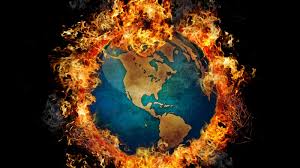(This is the fifth of a nine-part installment, offering a fresh new perspective on Climate Change. For the big picture summary, see Turning Climate Change on its Head.)
Human ingenuity and technology, combined with our unnatural quantitative value system, have ultimately led to multiple complex crises that directly threaten civilization as we know it. They include climate change, the Sixth mass extinction, resource scarcity, global poisoning, food insecurity, pandemic diseases, uncontrolled technologies, nuclear arms, overpopulation, and untenable social inequity. These have been collectively described as ecological overshoot. While there is no question that these crises are connected, solving any one of them will not solve the others.
The understanding that our present civilization is facing unprecedented multiple, simultaneous, globally looming disasters is becoming increasingly widespread, as indicated by new terms emerging in the media, such as meta-crisis and polycrisis. Here's a quick word on each (and there are more than are listed here):
climate change - The warming of the planet through the effect of human greenhouse gas emissions; already well-underway.
the Sixth mass extinction - A massive extinction of a high percentage of biodiversity; the previous one occurred 65 million years ago, wiping out the dinosaurs; this one is due to human activity.
resource scarcity - Resources for life and the products that we make are all being consumed faster than nature can replace them, including fossil fuels, fish stocks, and even clean air; also includes resources where the easily-accessed deposits have long since been taken, meaning more energy is required to find new stocks.
global poisoning - Human activity can result in poisons like lead showing up in unnatural places, or new poisons like pesticides and micro-plastics getting into biological systems with potential lethal (or long-term unknown damaging) effects.
food insecurity - A worsening lack of access to good, healthy, and culturally appropriate food; effects range from unhealthy populations living in constant stress to mass starvation.
pandemic diseases - Hardly need to say much on this except that CoViD-19 was not the first and there will likely be a shorter gap until the next.
uncontrolled technologies - This encompasses any of a number of scenarios where technology runs out of control; it could include artificial intelligence, but it might also cover overreliance on algorithms for social functioning and social media run amok.
nuclear arms - The war in Ukraine serves as a reminder that the threat of nuclear devastation or annihilation is sometimes only one madman away, not to mention the risk of nuclear deployment by error or non-state players, as systems and structures break down.
overpopulation - While this speaks for itself, other factors will include mass migrations of existing populations, as they leave areas of conflict and environmental disaster.
untenable social inequity - The gap between rich and poor is not only widening to unimaginable gaps, the number of people at the very top of the wealth pyramid is also shrinking; with private armies and huge swaths of humanity living in poverty, it is only a matter of time before this inequity explodes into conflict.
While there may be good arguments to show why these multiple disasters all appearing at the same time is not random coincidence, there is no apparent common addressable cause. (I have my own value system theories which we don't need to get into here.) Similarly, while some of their roots and effects are linked, many are not. It is difficult to see how solving the threat of nuclear war and the arms race would impact global pandemics, or how untenable social inequity is directly related to our poisoning of the global environment.
The key takeaway from this section is simply this:
Solving any one of them will not solve the others.
Since climate change is currently high on our societal awareness barometer, let's start there. Consider some actions that might be needed to mitigate or resolve climate change:
- increased adaptation to extreme weather effects
- reduced dependence on fossil fuels
- lowering resource consumption
- economic restructuring to discourage harmful activities
- switching to alternative energy sources
How would any of these effectively resolve pandemic diseases, uncontrolled technologies, nuclear arms, overpopulation, and untenable social inequity?
On the other hand, consider the effort that might be required to tackle such a massive worldwide challenge as climate change. Will there be any energy, focus, or resources available to tackle any of the other multiple pending complex crises? Not a chance.
That said, the very real impacts of climate change on our personal lives, right now, and the growing (and late) worldwide response, give this particular crisis special status. It is the role of climate change that we will look at next. I can't say for certain whether climate change mitigation or adaptation is even possible to the extent required, or not, but we will consider both possibilities.
(Continue to part 6 of 9)

No comments:
Post a Comment
[Dear Reader: I would *love* to receive your comments, but NOTE: Blogger will only accept comments here if your browser's Third Party Cookie blocking is turned OFF (even if just temporarily). Sorry! Not my software...]